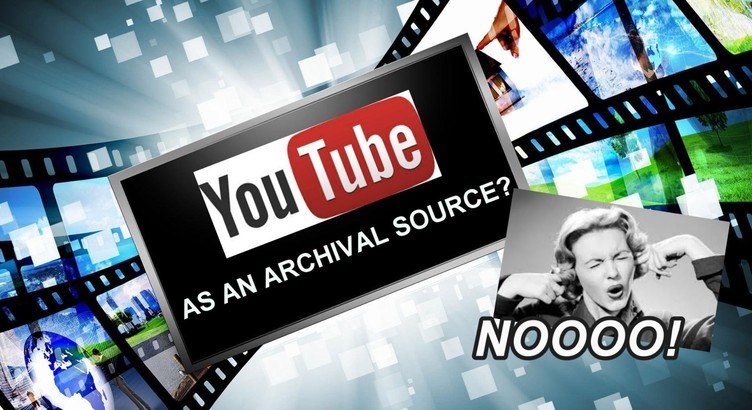
This from PAN reader James Paterson at the Australian Television Archive, Broadcast Film & Video Digitisation Services:
The convenience and ubiquity of YouTube have enticed many television networks and production companies to use it as an archival resource. However, this seemingly innocuous trend is jeopardizing the preservation and integrity of our television and film heritage.
Key Concerns:
1. Quality Compromise: Each rebroadcast of a low-quality YouTube clip risks making it the primary version of that content, diluting the original’s quality over time.
2. Endangering Master Copies: Frequent sourcing from YouTube means that high-quality master recordings may be overlooked, leading to their potential loss or discarding. The tragic result? Future generations may only have access to inferior low quality /compressed versions..
The Root of the Trend:
Budget Constraints: Tight budgets, inadequate resources, and pressing schedules often force professionals to seek faster, cost-effective alternatives. YouTube, being free and immediate, often becomes the default choice, bypassing the time-intensive process of sourcing from master recordings.
Absurdities and Implications:
Lost Opportunities: There have been instances where even readily available high-quality sources like Blu-rays or DVDs were sidestepped in favor of YouTube clips. In more extreme cases, some networks misleadingly claimed YouTube-sourced content as treasures “unearthed” from their archives.
The Devaluation Cycle: Each decision to source from YouTube diminishes the perceived importance of preserving master tapes, leading to potential loss of material and overall quality of viewer experience.
Forward Thinking:
While it might seem grim, with traditional television on the decline and modern viewers increasingly content with lower-quality streams, it’s imperative to break the cycle. We must:
Champion Quality: Advocate for the importance of sourcing and preserving high-quality master copies for posterity.
Educate Stakeholders: Convince content holders about the long-term benefits of safeguarding and digitizing master copies, framing it as a crucial investment for the future.
Promote Responsibility: Encourage production houses to prioritize and allocate budget for archival quality over short-term convenience. In an era where technological advancements are rapid, ensuring the integrity and quality of our content will serve us well in the unforeseen innovations of tomorrow.
In closing, our television and film history is an irreplaceable treasure. We have a collective responsibility to ensure its accurate representation and longevity. Using platforms like YouTube for convenient archival might be tempting, but it comes at the immeasurable cost of eroding our cultural legacy. Let’s prioritize preservation of our master material to ensure our history remains rich and intact for future generations.
James Paterson.
Industry reaction to this post from PAN readers:
Steve Bergson, Director at Prism Digital Comms: Hi James – you’re right on all of this but the budgetary constraints are always going to be overriding principle, I’m sorry to say. The short sighted nature of most project’s focus is too often overlooked even in the knowledge of the harm done. The only response is to steer producers to the better quality often rarer material not on YouTube. It’s important archives don’t sell their souls by putting low grade copies of their best assets on YouTube in the name of astute marketing, an admittedly tough call for them to make. It has to be made an entirely bad option to use content off YouTube with the only way forward to offer positive solutions. Nobody would use poor quality material off YouTube if better but affordable options were accessible in a timely way and readily available using non online channels like human beings!
• Related on PAN: View: Latest recovery and preservation digitisation project by Australian Television Archive










